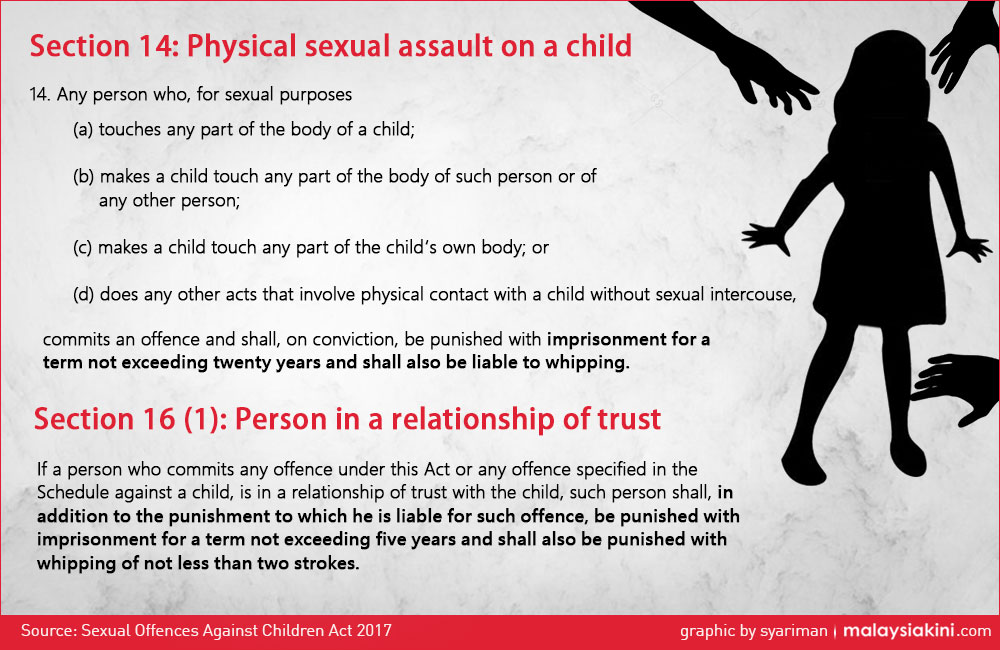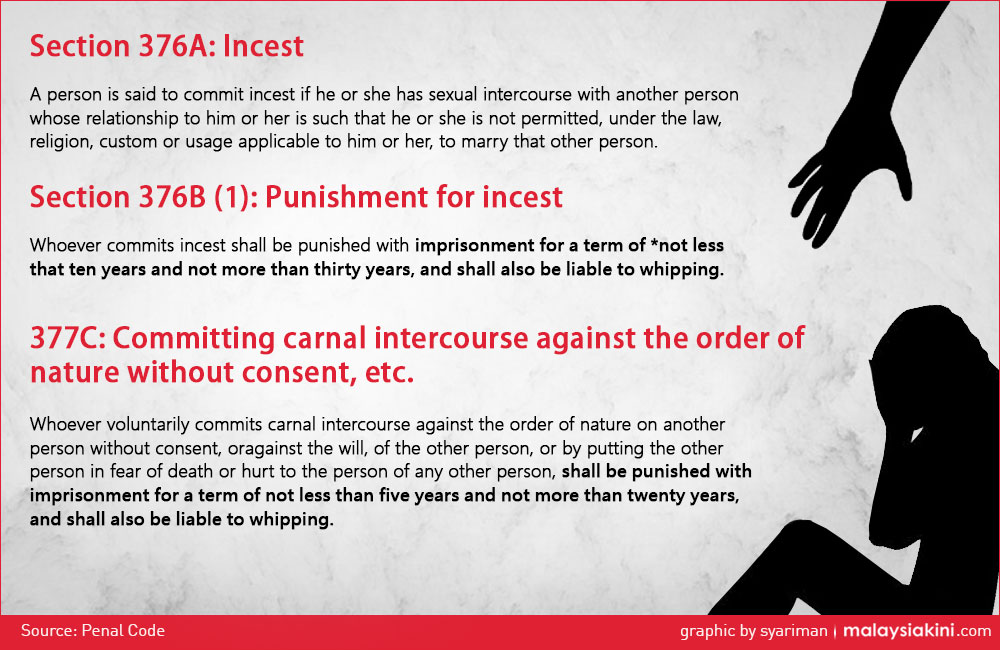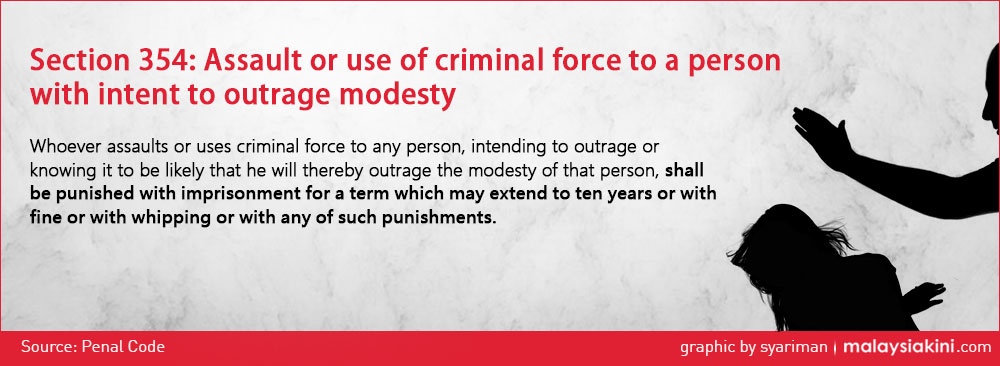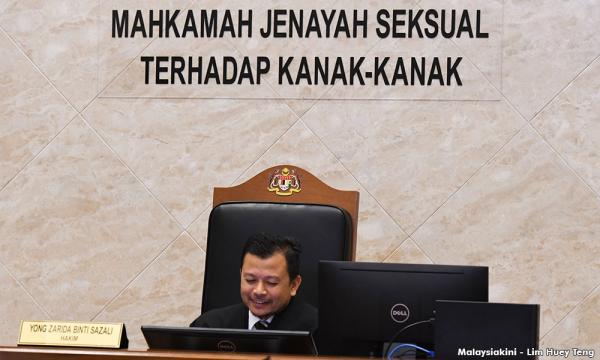KINIGUIDE | The recent case of the father facing 626 charges of committing sexual crimes on his 15-year-old daughter, including 594 counts of sodomy, has sent Malaysians reeling in shock.
The charges were so numerous that it took close to two full days for the court to hear the complete reading of the charges by a court interpreter.
However, it is also noteworthy that this is the most significant case to be brought before the Special Court for Sexual Crimes Against Children in Putrajaya since it began operating on July 4 this year.
The setting up of the court is in tandem with the Sexual Offences Against Children Act 2017 (Soaca) that was passed by Parliament last April, amid concerns that existing laws at that time were inadequate to protect children against sexual predators.
So, is the father charged under Soaca?
Part of the 626 charges that the man is facing comes under the Sexual Offences Against Children Act, specifically Sections 14 and 16 of the Act.
 Section 14 deals with “physical sexual assault on a child”, and those convicted under this can be punished with imprisonment for a term not exceeding 20 years, and shall also be liable to whipping.
Section 14 deals with “physical sexual assault on a child”, and those convicted under this can be punished with imprisonment for a term not exceeding 20 years, and shall also be liable to whipping.
Meanwhile, Section 16 states that if a person who commits any offence under the Act is in a “relationship of trust” with the child, the person shall be punished with imprisonment for a term not exceeding five years and also whipping of not less than two strokes, in addition to the punishment for the offence itself.
What else is he being charged under?
The father is also being charged under Section 31(1)(a) and 31(1)(b) of the Child Act. It should be noted that these two provisions were part of the amendments to the Child Act that were gazetted in 2016.
 On top of that, he was also charged under Section 376A and 377C of the Penal Code, which deals with incest and committing sodomy without consent, respectively.
On top of that, he was also charged under Section 376A and 377C of the Penal Code, which deals with incest and committing sodomy without consent, respectively.
The punishment for incest under the Penal Code is imprisonment of between 10 and 30 years and the person convicted is also liable to whipping.
Meanwhile, any person convicted of committing sodomy without consent shall be punished with imprisonment for a term of between five and 20 years, and shall also be liable to whipping.
That is a lot of charges, with significant punishments.
Yes, and according to attorney-general Mohamed Apandi Ali, this man is the first person in the country to be prosecuted with hundreds of charges for sexual crimes.
If the accused is convicted of all 626 charges, he could potentially face more than 12,000 years of imprisonment.
What about the amendments to the Child Act? Does that affect the charges against him?
Yes, it does indeed. The amendments, which were gazetted in July last year, have a direct effect on the levity of punishments meted out under Section 31(1).
Before the amendments, those convicted under Section 31(1) would be liable to a fine not exceeding RM20,000 or to imprisonment for a term of up to 10 years or both.
However, the new amendments have increased the punishment to a fine not exceeding RM50,000 or imprisonment of up to 20 years or both.
With the new amendments to the Child Act, the father could be facing more than double the punishment if he is convicted for the offence.
Then, is it necessary to have Soaca?
Deputy public prosecutor Aimi Syazwani Sarmin, who in charge of the case against the father, told Malaysiakini that if the Sexual Offences Against Children Act did not exist, then it is possible that the accused would instead be charged under Section 354 of the Penal Code.
 Section 354 deals with “assault or use of criminal force to a person with intent to outrage modesty”.
Section 354 deals with “assault or use of criminal force to a person with intent to outrage modesty”.
Any person convicted under this provision would face imprisonment for a term of up to 10 years, or a fine or whipping, or any two of such punishments.
In other words, the accused in this case would have been facing a milder punishment under Section 354, compared with the Soaca.
What else does Soaca deal with?
The Act, which was gazetted on July 7 this year, also deals comprehensively with offences related to child pornography, including the producing, distributing and accessing of child pornography.
It also deals with offences related to child grooming, which is befriending and establishing an emotional connection with a child to lower their inhibitions against sexual abuse, as well as offences related to sexual assault.
Aside from that, the Act also addresses persons in a relationship of trust with a child who commits any such offence against that child.
The Act also aims to facilitate court cases involving child witnesses.
The harshest punishment in this Soaca is an imprisonment term of up to 30 years or six strokes of whipping.
What about the Special Court for Sexual Crimes Against Children?
When Prime Minister Najib Abdul Razak launched this court on June 22, he had said that he hoped the setting up of this court in Putrajaya would help expedite cases of such nature.
Last Saturday, Chief Justice Md Raus Sharif revealed that a total of 14 cases under the Sexual Offences Against Children Act have been resolved since the launch of the court.
Only 48 cases remained to be heard, with only three of those cases from last year.
On Aug 4, it was reported that a bakery assistant was the first person to be sentenced under the Sexual Offences Against Children Act.
The bakery assistant was sentenced to six months’ jail for committing physical contact with a 15-year-old secondary school student last month.
What else is the government intending to do to tackle sexual crimes against children?
When Najib launched the Special Court for Sexual Crimes Against Children in Putrajaya back in June, he had already expressed the intention to expand this initiative to other states in Malaysia.
Law Minister Azalina Othman Said had then said that the government was exploring the possibility of expanding such courts to Selangor, Johor and Penang.
“Those are the states that will have a lot of cases registered. We hope some of the important courts that are needed because of the volume (of cases) can be established by this year; if not, we are targeting early next year,” Azalina had said.
She also said that the government was looking into allowing the Legal Aid Department to participate as legal companions in sexual crime cases involving child witnesses.
“In some cases, not every victim has the financial capacity to appoint his or her own lawyer for watching brief. This is where the government must come in to assist (in terms of) the legal companion,” she explained.
Legal companions are meant to ensure that the child witness can be guided on questions posed during court proceedings.
This instalment of KiniGuide was prepared by Geraldine Tong.


